Location: Phoenix, AZ
American Psychiatric Nurses Association (APNA) Annual Conference
APNA 39th Annual Conference
Empowered to Innovate and Collaborate: PMH Nurses Shaping Care Excellence
October 15-18, 2025
New Orleans Ernest N. Morial Convention Center
New Orleans, Louisiana
Jake Mearse: Navy Veteran Navigates a Unique Role as a Male Nurse-Midwife
 Military personnel are known for their discipline, preparation, and commitment to service. As a former Naval Officer, Frontier Nursing University graduate Jake Mearse, CNM (Class 137), PMHNP, DNP, continues to display those same traits as he breaks down barriers in service to those in his community.
Military personnel are known for their discipline, preparation, and commitment to service. As a former Naval Officer, Frontier Nursing University graduate Jake Mearse, CNM (Class 137), PMHNP, DNP, continues to display those same traits as he breaks down barriers in service to those in his community.
Today, Dr. Mearse is a certified nurse-midwife with his own practice, offering home births and clinical care in Midway, Georgia. Being a male nurse-midwife does not make him one of a kind, but he’s in rare territory. The American Midwifery Certification Board’s Demographic Report released in January 2024 found that less than 1 percent (88 out of 14,198) of all AMCB-certified midwives identified as male. There’s no data on how many of those 88 served in the U.S. Navy for 25 years, but it’s safe to assume it is an exclusive group.
“I’m third generation Navy, so that was kind of expected almost. That’s what our family does,” said Mearse, who grew up in Bend, Oregon, and joined the Navy when he was 18. “While I was in the Navy, I got into the medical field as a Navy Hospital Corpsman and served aboard submarines mostly in that role. Eventually, the Navy sent me to nursing school.”
The Navy’s Medical Enlisted Commissioning Program allows sailors and Marines to earn a nursing degree and become a Navy Nurse Corps Officer. Mearse utilized this opportunity to attend Hawaii Pacific University while stationed at Pearl Harbor.
“I had absolutely no interest in labor and delivery or midwifery or anything related to that,” Mearse said. “I spent most of my time as a nurse in the ER/trauma world. I loved the ER/trauma nursing. I was deployed in the Middle East a couple of times doing Mobile Trauma Bay. Once I got a commission, I worked as an RN full time.”
Mearse met his wife April in the Navy, and in 2004, they had their first child with the help of FNU graduate Michelle Munroe, DNP (Class 11), APRN, CNM, FACNM, FAAN.
“She was our midwife for two of our kids,” said Mearse, who now has seven children. “She’s the one who talked me into becoming a midwife. She pulled me aside during a prenatal visit and said, ‘I think you might want to look into doing this. You might be good at this.’ That seed that Michelle planted in my head just kept growing. Unfortunately, if you are a nurse and you’re a 6-1, 200-pound man, every time you say, ‘I want to go into labor and delivery’, they say, ‘That’s very nice, you’re going back to the ER.’ So, I had to do it on my own time.”
During his last few years in the Navy, Mearse used his accrued leave time to finish his midwifery training. He then entered the Navy’s “Duty Under Instruction” program in which participants stay in active duty while pursuing a degree. He attended the University of Washington with plans to become a nurse-midwife, but the Navy approved him for the psychiatric-mental health nursing curriculum instead.
 “The whole time I was going through my DNP program studying psychiatric nursing, I was taking extra classes in women’s health, labor and delivery, trying to get as close into that world as I could,” Mearse said. “I wanted to be a midwife.”
“The whole time I was going through my DNP program studying psychiatric nursing, I was taking extra classes in women’s health, labor and delivery, trying to get as close into that world as I could,” Mearse said. “I wanted to be a midwife.”
Inspired by Dr. Munroe, Mearse approached FNU about enrolling in the nurse-midwifery program.
“Best decision I ever made,” Mearse said. “The biggest thing that was helpful with Frontier was the flexibility of the program. I was coming to them saying, look I’ve got my DNP in a field I don’t necessarily want to spend the rest of my life, and I’m active-duty military, so I’m going to have long stretches where I can’t do school and I’ll have to jump back into it. Frontier was the only school that said, ‘You know what, tell us what you need, and we’ll make it work.’ They were just incredible.”
Still, Mearse faced more hurdles before achieving his goal of becoming a nurse-midwife. He encountered significant pushback against the idea of a man being a midwife.
“On my very first day of clinical rotations, at my first clinical site, I was with a group practice, and one of the midwives in the group pulled me aside and said, “‘Just so you know, I don’t think men belong in midwifery. I do not want to help you. Please don’t ask me for anything.”’ It was a little discouraging Day 1,” Mearse said. “I had a very similar experience in a midwifery job that I took. One of my new partners pulled me aside and said, ‘I am not working with you. I am offended that you’re here. I don’t believe that men belong here, and I will do anything I can to get you out of here.’”
Mearse said that the only times he has experienced such gender discrimination, it has come from colleagues, not patients. He noted that patients who asked for a different provider cited cultural or religious reasons.
“For the most part, in my experience, patients don’t really care what your gender is. They just want to be taken care of,” Mearse said.
Mearse took a position at an Army hospital at Fort Stewart in southeast Georgia, and he and his family fell in love with the area. In 2002, Mearse opened Coastal Midwifery and Women’s Health, which was a success from day one.
“Before I had even advertised or even posted on social media that I would be doing home births, we started getting calls,” he said. “We got full really fast. Now we are at a point where we are having to turn moms away every month because we are full.”
Mearse strives to keep his schedule to five or fewer home births per month, and the clinic is open three days a week. At the clinic, Mearse provides full-scope gynecology and primary care, including IUDs, contraception management, and colposcopies.
To make access to care as convenient and accessible as possible, the clinic is open from 1:00 to 10:00 p.m.
 “Our hours are based on what I remember being a dad in the military and never getting to go to appointments because all of the OB offices were always open 9-5 Monday through Friday,” Mearse said. “We decided to do things a little differently. We are open from 1 p.m. to 10 p.m., and we do two weekdays and Saturday because we really want families to be able to participate. We want to make this as family-friendly as we possibly can.”
“Our hours are based on what I remember being a dad in the military and never getting to go to appointments because all of the OB offices were always open 9-5 Monday through Friday,” Mearse said. “We decided to do things a little differently. We are open from 1 p.m. to 10 p.m., and we do two weekdays and Saturday because we really want families to be able to participate. We want to make this as family-friendly as we possibly can.”
Accordingly, running the clinic is very much a family project. Mearse’s wife, April, who is also a Navy veteran, is not medically trained but attends all the births to provide support and helps run the clinic.
“People come to the practice because they want a midwife. They stay with the practice because they meet April,” Mearse said. “Our kids are getting older now, but April is kind of the surrogate mom, especially to a lot of these young military moms who are 20, 21 years old, on the other side of the country from home. She helps set things up and take things down, but her most important role is being a hand-holder and encourager. She has that experienced mom energy where she can hold a young woman’s hand and say, ‘I’ve done this seven times. We’re going to get you through it. You’re going to be OK.’ I love the fact that a lot of our clients will text April instead of me.”
Yes, Jake and April have seven children, who are also active participants in the clinic’s day-to-day operations. They strip the beds, clean, and prepare rooms for the next client. They also help interact with the other children brought into the clinic, which features separate playrooms for older and younger children.
“We’re largely a military community, and we will have moms come in for their appointment, and they’ve got other little kids and the dad’s deployed,” Mearse said. “Because we have my kids there to help, moms can feel comfortable coming into their appointment they can relax and do their appointment without worrying about what the kids are doing.”
Mearse schedules 60-minute time slots for all his patients, ensuring ample time for questions and discussions about their care.
“We want our patients to be able to ask questions and get to know us and us to get to know them,” Mearse said. “I love the fact that we have a lot of moms who will come in and just hang out in the clinic even if they’re not being seen that day. They just want to come and sit and chat and drink coffee and be there. It’s wonderful.”
As veterans, Jake and April are particularly excited to be able to offer care to a large number of military families.
“When we first started this, one of the commitments we made is that we were going to try and make this affordable for military families,” Mearse said of the military discounts offered at Coastal Midwifery and Women’s Health. “We are just 10 minutes down the road from Fort Stewart. Even though we’re not able to do this for free for military families – I wish we could – they end up paying sometimes less than half of what they would pay elsewhere. If we’re making just enough to break even, I’m fine with that. We’re able to serve these people that are serving our country.”
Mearse hopes to be able to offer even greater access to care soon. He plans to hire another nurse-midwife as soon as she graduates.
“Right now, we are turning a number of moms away each month because we’re full, so it will be nice to be able to take more moms because there will be two of us,” Mearse said. “I’ve been on call 365 days a year for three-and-a-half years now. It will be amazing to be able to take a vacation and leave the practice in someone else’s hands for a little bit.”
Frontier Nursing University prepares PMHNP students with advanced clinical simulations
Frontier Nursing University’s flexible, online psychiatric-mental health nurse practitioner program aims to prepare competent, compassionate, and well-equipped Psychiatric-Mental Health Nurse Practitioners (PMHNPs). FNU offers a graduate PMHNP specialty track that can be pursued full- or part-time while completing a Master of Science in Nursing or a Post-Graduate Certificate.
The curriculum of FNU’s PMHNP program is structured to provide a comprehensive foundation in assessing, diagnosing, and treating psychiatric disorders. Emphasis is also placed on health promotion and disease prevention. Before students embark on their clinical journey, FNU ensures they are thoroughly prepared through a didactic curriculum that not only equips students with essential skills, but also builds confidence in their abilities.
“Our focus is on training innovative nurse practitioners who have a passion for serving their communities, and we accomplish that with a unique blend of didactic coursework and clinical experience. Our students value the flexibility of our distance education program as it allows them to stay in their home communities while advancing their careers to improve access to care,” said Dr. Kevin Scalf, Department Chair of the Department of Psychiatric-Mental Health.
A standout feature of FNU’s PMHNP program is the Clinical Bound experience, a five-day immersive skills intensive held on the university’s campus in Versailles, Kentucky. This unique opportunity allows students to refine their clinical skills under the guidance of experienced faculty before beginning their clinical practicum.
Central to the Clinical Bound experience are the sophisticated clinical simulations designed to replicate real-world scenarios encountered by PMHNPs. These simulations provide a safe yet realistic environment for students to apply their knowledge and skills. FNU’s simulation rooms closely resemble actual clinical settings, enhancing the authenticity of the learning experience.
A key component of FNU’s clinical simulations is the use of standardized patients (SPs). These individuals, trained to portray specific psychiatric conditions or symptoms, enable students to practice patient interactions in a controlled setting. Through scripted scenarios, students engage in comprehensive assessments, develop treatment plans, and hone their therapeutic communication skills.
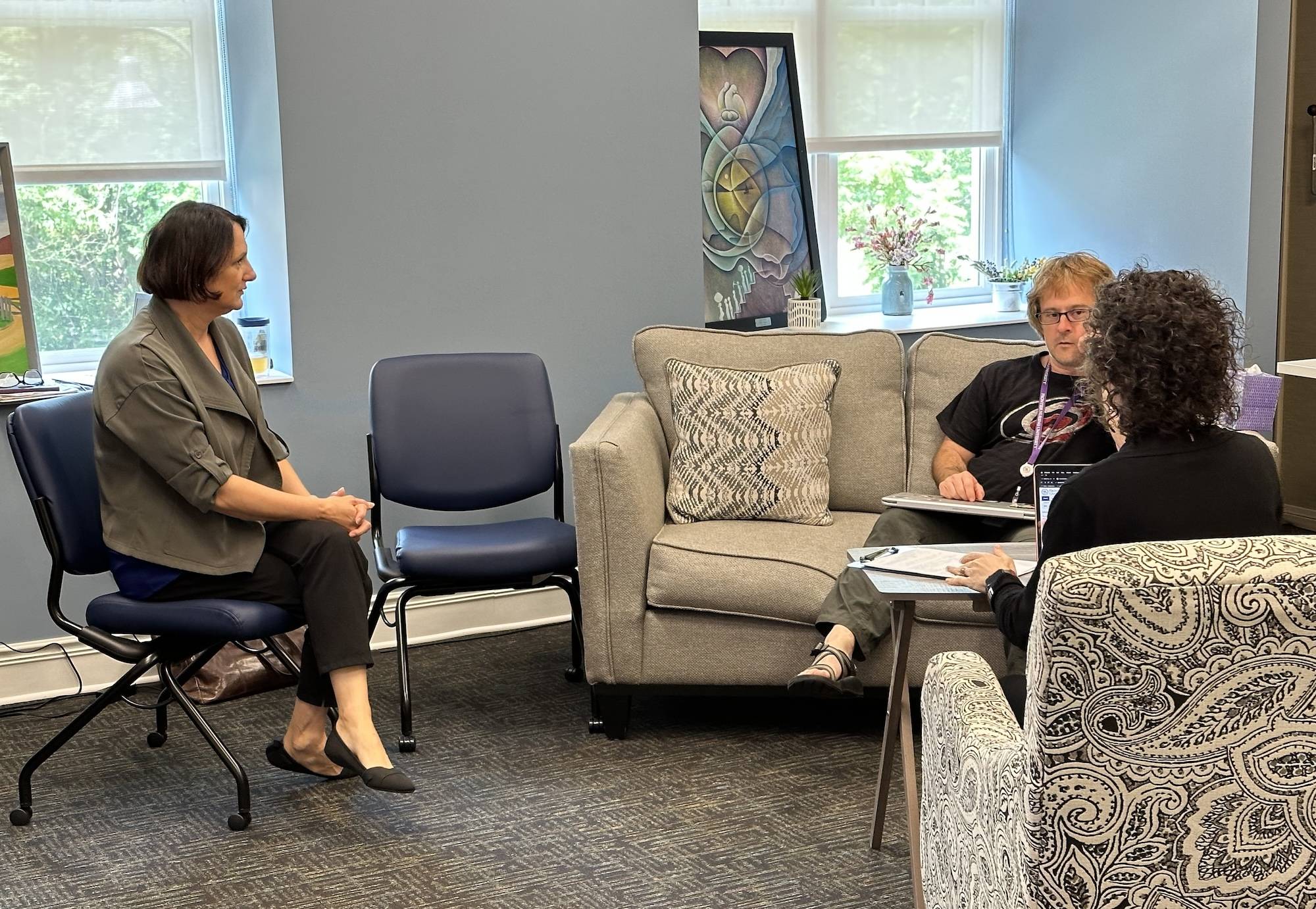
During Clinical Bound, faculty members facilitate discussions, peer-learning activities, and practice sessions to maximize student engagement and learning. Immediate feedback provided by faculty and SPs allows students to reflect on their performance and identify areas for improvement.
One of the distinctive aspects of FNU’s Clinical Bound is the integration of technology to facilitate remote learning and observation. Using SimIQ software, students not directly involved in the simulation can observe their peers’ encounters in real-time from nearby classrooms or remote locations. This innovative approach promotes collaborative learning and allows for helpful feedback from both faculty and peers. By offering in-person clinical simulations and integrating SimIQ software, students are equipped with the necessary tools to interact with patients not only in a traditional in-person setting but also in a telehealth environment. This adaptability is increasingly crucial as healthcare access continues to evolve and telehealth becomes more prevalent.
These recordings serve as valuable resources for post-simulation debriefing sessions, where students can evaluate their performance and gain insights into their clinical practice. Through guided reflection, students deepen their understanding of complex patient interactions and refine their clinical skills for future practice.
The success of FNU’s Clinical Bound and the clinical simulation offered during the experience is a testament to the university’s commitment to excellence in PMHNP education. By combining hands-on clinical training with cutting-edge simulation technology, FNU prepares its students to meet the evolving demands of mental healthcare delivery.
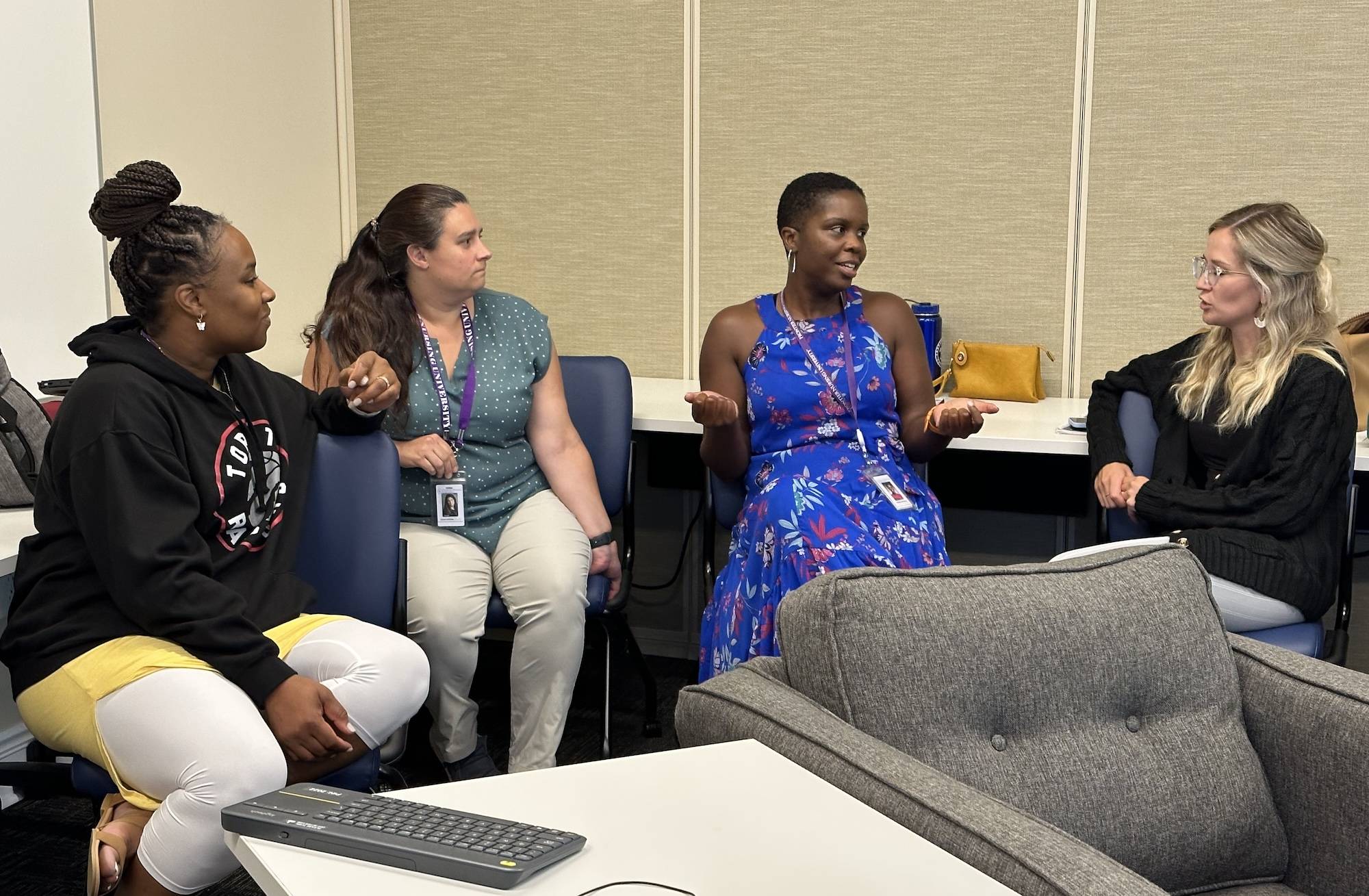
FNU psychiatric-mental health nurse practitioner students have an overall ANCC certification exam pass rate of 98% compared to the national overall ANCC pass rate of 90%. As graduates of FNU’s PMHNP program, students emerge as compassionate and culturally competent providers ready to address the mental health needs of diverse, rural and underserved populations.
To learn more about FNU’s PMHNP program, visit frontier.edu/psych-mental-health-nurse-practitioner.
Learn more about advanced nursing degrees and specialties at Frontier Nursing University. Subscribe to our blog for the latest news and events at FNU and to get inspired with stories featuring our alumni, students, faculty, preceptors and staff!
Student Spotlight: Jazmene Landing Advocates for Mental Health Awareness
At the heart of Frontier Nursing University is a talented and diverse community of students, alumni, faculty, staff, couriers and preceptors. Spotlight blogs feature members of our FNU community who are focused on the mission of educating nurse-midwives and nurse practitioners to deliver quality healthcare to underserved and rural populations.
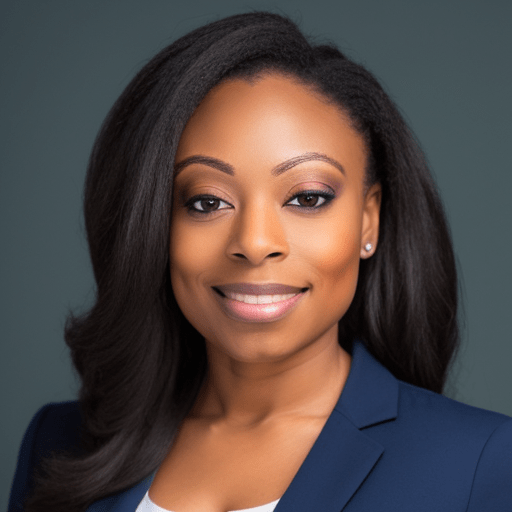 Just a 20-minute drive from the FNU campus, registered nurse Jazmene Landing works at a comprehensive outpatient addiction clinic in Lexington, Kentucky. There, she cares for an underserved population of urban patients who are often stigmatized and overlooked due to addiction and mental health issues.
Just a 20-minute drive from the FNU campus, registered nurse Jazmene Landing works at a comprehensive outpatient addiction clinic in Lexington, Kentucky. There, she cares for an underserved population of urban patients who are often stigmatized and overlooked due to addiction and mental health issues.
“My job as a nurse is to not only provide care to these individuals,” said Landing, “but to also serve as an advocate.”
When she noticed a strong need in her community for advanced practice nurses who look like the patients they serve, Landing decided to become a Psychiatric-Mental Health Nurse Practitioner (PMHNP). Thanks to her proximity to FNU, she knew just where to go! Now a FNU PMHNP student, she is on-track to earn her Master of Science in Nursing later this year.
“Frontier is home,” Landing said. “I didn’t have to travel or move far away to gain the knowledge and experiences I’ve gained, or the connections I’ve made. At FNU, they care about their students and the professionals we will become.”
Landing found valuable support in joining student organizations, especially the Professional Organizational Mentoring Program (POMP), which matches FNU faculty mentors with students from underrepresented groups. Throughout the mentorship, students join a professional organization in their field, attend a conference with fellow nurse practitioners, and gain a better understanding of the nursing profession. Landing attended AANP in 2023, and shared the following on her experience:
“I had the privilege of attending the American Association of Nurse Practitioners (AANP) Conference in New Orleans. As a Psychiatric-Mental Health Nurse Practitioner (PMHNP) student, it was both exciting and enriching to engage with established nurse practitioners and network throughout the event. Through POMP, I had the opportunity to connect with fellow students from my track as well as other specialties, enhancing our learning experience through participation in various sessions.
My faculty member played a crucial role in this experience. Despite our different program backgrounds, Family Nurse Practitioner (FNP) and PMHNP, we found similarities in our shared commitment to patient care. This collaboration stressed the value of networking and the importance of establishing a professional presence at national conferences.
The conference also allowed me to explore exhibits and review presentations focused on psychiatry, which I later brought back to the clinic where I work as a registered nurse. This experience reaffirmed that POMP offers more than just a conference trip; it is a significant opportunity to connect with peers, gain valuable insights, and represent our university effectively.”
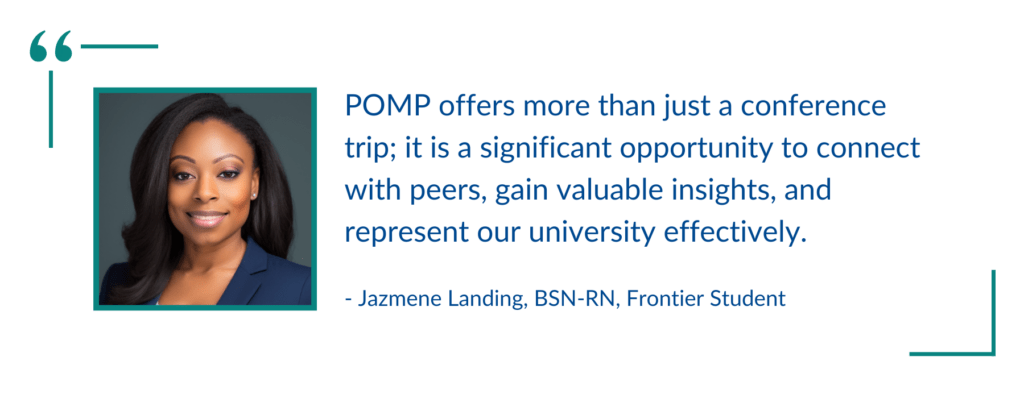
Landing says MH707: Psychiatric-Mental Health Assessment Across the Lifespan was the most interesting course she’s taken so far. She loved how the class encouraged her to explore how mental health affects people in all walks of life, in different ages and stages, and how they often hide behind their mental health conditions due to fear of being criticized or labeled.
“As a PMHNP, I will be able to give an even stronger voice to those who are afraid of seeking treatment for addiction, or those struggling with mental health stigma,” said Landing.
Outside of work and school, Landing is a busy mother of three daughters, a role she calls “the greatest gift . . . the most satisfying and difficult job at the same time.” In her down time, she enjoys watching sports, reading books, and sitting by the fire.
Thank you, Jazmene, for choosing FNU in your healthcare journey and for providing quality care to underserved populations in your community!
Learn more about advanced nursing degrees and specialties at Frontier Nursing University, including our Psychiatric-Mental Health Nurse Practitioner program. Subscribe to our blog for the latest news and events at FNU and to get inspired with stories featuring our alumni, students, faculty and staff!
Student Spotlight: Heather Figi plans to integrate background in arts as a PMHNP to offer whole-person care
At the heart of Frontier Nursing University is a talented and diverse community of students, alumni, faculty, staff, couriers and preceptors. Spotlight blogs feature members of our FNU community who are focused on the mission of educating nurse-midwives and nurse practitioners to deliver quality healthcare to underserved and rural populations.
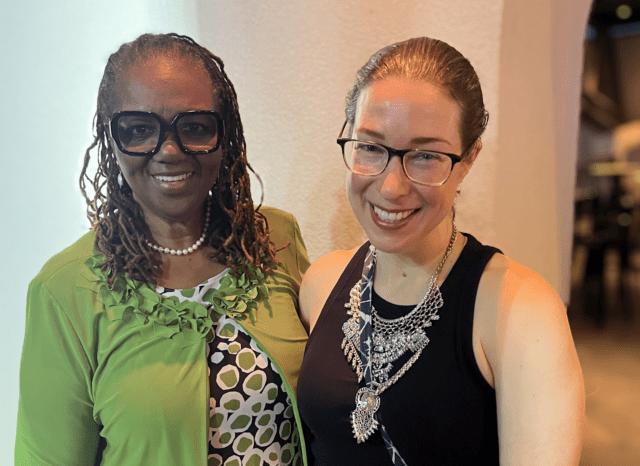
Heather Figi and FNU Dean for Inclusive Excellence and Student Success Dr. Paula Alexander-Delpech at the APNA National Conference
For FNU student Heather Figi, RN, BSN, life is about fulfilling two principles: “we are here to do great things with the gift of our lives” and “we are here to serve others.”
These beliefs empowered her to resume her education in 2011 with the aim of becoming a Psychiatric-Mental Health Nurse Practitioner. On track to graduate this year, Figi is currently pursuing her MSN in the Psychiatric-Mental Health Nurse Practitioner program at FNU. Drawing from her rich background in music and education, Figi intends to integrate these experiences with her healthcare education. She said she seeks to embody the essence of psychiatry, derived from its Greek roots, where “psukhē” denotes soul or mind, and “iatreia” signifies healing.
“With the education I am receiving from Frontier Nursing University, I plan to merge my background in the arts with healing to offer holistic, whole-person psychiatric care,” she said.
A resident of Janesville, Wisconsin, Figi currently serves as a psychiatric RN, primarily providing care for underserved populations. In her work, she seeks to offer dignity to patients while assessing and addressing unmet medical needs such as dental needs, wounds and injuries. She said many of her patients receive inpatient care at the area psychiatric hospital, and are in the acute phase of schizophrenia. Many of her patients also have substance use disorder and lack of housing.
In pursuing her degree at FNU, Figi said she seeks to alter perspectives, advocating for the brain to be regarded as neutrally as any other organ, thereby diminishing the stigma surrounding mental health. She said her favorite subject she has studied at FNU thus far has been psychopharmacology due to the way in which instructors weave together the brain with biological mechanisms and symptomatology.

APNA National Conference
Figi said FNU has offered the structure and flexibility to allow her to reach her goals.
“I feel that through the structure of this program, FNU honors nursing professionals by accommodating them for individualized plans that allow for life to happen, trajectories to change and lots of personal guidance along the way,” she said.
Figi said FNU has also been a catalyst for professional development, particularly through the Professional Organizational Mentoring Program (POMP), which matches FNU faculty with nurse practitioner and nurse-midwifery students from underrepresented groups to provide support and mentorship. The program allows students to join a professional organization in their field and gives them the opportunity to attend a professional conference with their mentors. Figi attended the APNA National Conference with Dr. Paula Alexander-Delpech.
“I deeply valued attending the national conference, connecting with one of the stunning faculty members here at FNU, and getting to pick her brain, have fun and share some dessert,” she said. “I had several degrees before coming to FNU and have never felt as supported as I have with the POMP opportunity.”

When she is not at work or pursuing coursework at FNU, Figi enjoys taking walks, pursuing HIIT and capoeira exercise, singing, drawing and spending time with her nephews and niece.
Thank you, Heather, for your work with underserved populations and for your ongoing commitment to expanding your impact through education at FNU.
Learn more about advanced nursing degrees and specialties at Frontier Nursing University, including our Women’s Health Care Nurse Practitioner Program. Subscribe to our blog for the latest news and events at FNU and to get inspired with stories featuring our alumni, students, faculty and staff!
FNU Names Dr. Susan Piper as Clinical Director of the Psychiatric-Mental Health Nurse Practitioner Program
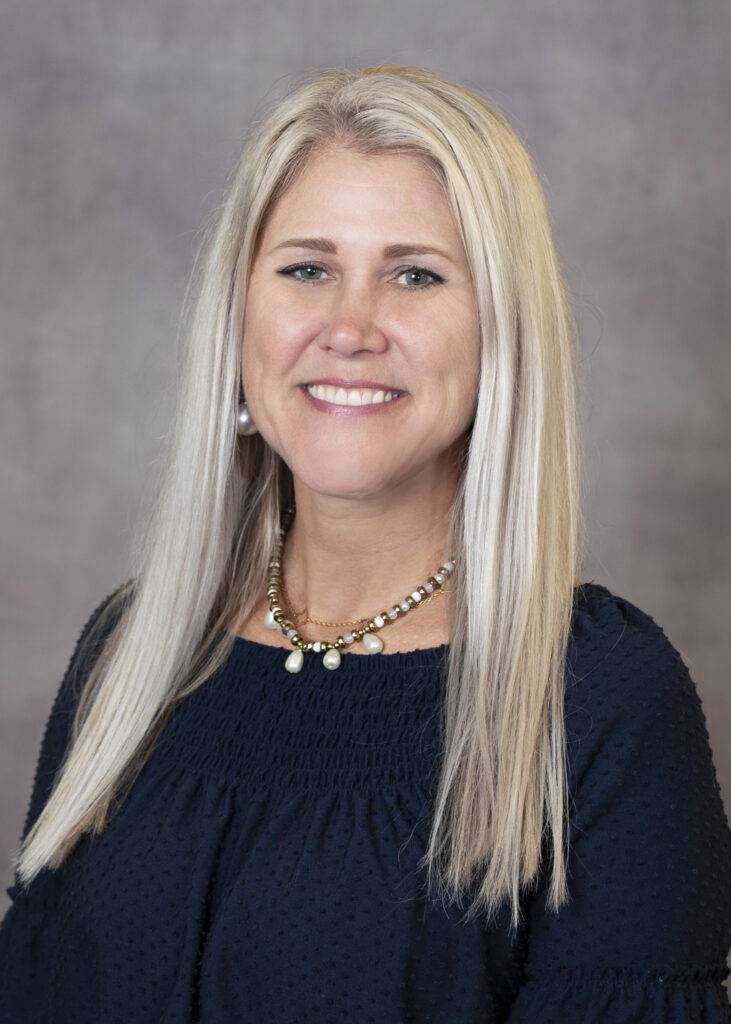 Frontier Nursing University (FNU) has announced that Dr. Susan Piper, DNP, APRN, PMHNP- BC, has accepted the position of Clinical Director for the Psychiatric-Mental Health Nurse Practitioner (PMHNP) Program. Dr. Piper has been a faculty member at FNU since 2018.
Frontier Nursing University (FNU) has announced that Dr. Susan Piper, DNP, APRN, PMHNP- BC, has accepted the position of Clinical Director for the Psychiatric-Mental Health Nurse Practitioner (PMHNP) Program. Dr. Piper has been a faculty member at FNU since 2018.
“We are very happy to announce Dr. Piper as our Clinical Director for the Psychiatric-Mental Health Nurse Practitioner Program,” said FNU Dean of Nursing Dr. Joan Slager, CNM, DNP, FACNM, FAAN. “Her expertise and leadership will be a tremendous asset to this rapidly growing and essential program.”
PMHNP program Department Chair Dr. Kevin Scalf, DNP, PMNHP-BC, CNEcl, welcomes Dr. Piper back into the role she previously held before the COVID pandemic when personal demands largely related to her service in the National Guard caused her to step away. Dr. Piper has also served as Regional Clinical Faculty and as a Clinical Bound Team Leader at Frontier.
“Dr. Piper has performed at the highest levels throughout her career at Frontier,” said FNU President Dr. Susan Stone, CNM, DNSc, FAAN, FACNM. “Her knowledge and experience are of great value to our students, who graduate well-prepared to help address the vast need for psychiatric-mental healthcare throughout our country.”
Dr. Piper received a Master of Science in Nursing from Western Kentucky University in 2010, emphasizing nursing education. In 2016, she received a post-master’s certificate focused on psychiatric-mental health. She was awarded a Doctor of Nursing Practice degree from Murray State University in 2018. Dr. Piper served 32 years in the Kentucky National Guard and was the Chief Nurse for the Kentucky National Guard’s Mobile Vaccination Team during the COVID pandemic.
“I am honored to accept the position of Clinical Director for the Psychiatric-Mental Health Nurse Practitioner program at Frontier Nursing University,” Dr. Piper said. “Our students are so talented and so eager to learn. Working with them, Dr. Scalf, and everyone at Frontier is a joy. We are devoted to preparing our students to be caring, compassionate, and highly-trained psychiatric-mental healthcare nurse practitioners who positively impact their communities.”
Frontier Nursing University Names Dr. Nancy Pesta Walsh as Clinical Director of the Department of Family Nursing
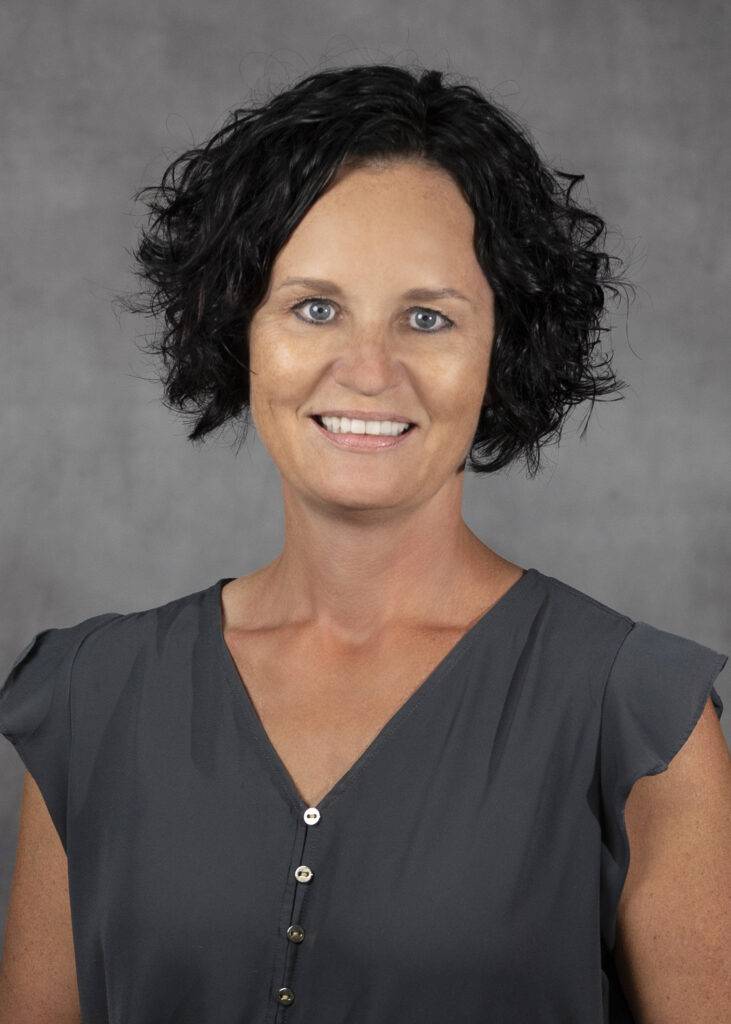
Dr. Nancy Pesta Walsh, DNP, FNP-BC, PMHNP- BC, Clinical Director for the Department of Family Nursing
Frontier Nursing University has announced that Dr. Nancy Pesta Walsh, DNP, FNP-BC, PMHNP- BC, has accepted the position of Clinical Director for the Department of Family Nursing. Dr. Walsh has been a faculty member at FNU since 2010.
“We are very excited to announce Dr. Pesta Walsh as our Clinical Director for the Department of Family Nursing,” said FNU Dean of Nursing Dr. Joan Slager, CNM, DNP, FACNM, FAAN. “In this role, her experience and expertise as a clinician and educator will be of tremendous value to our students and to the university as a whole.”
Dr. Pesta Walsh, who also serves as a family nurse practitioner at Hutchinson Health in Hutchison, Minnesota, earned her Bachelor of Science in Nursing from the College of Saint Benedict in Saint Joseph, Minnesota. She went on to obtain both her Master of Science in Nursing (MSN) and her Doctor of Nursing Practice (DNP) degrees from FNU in 2008 and 2010, respectively. She obtained a post-doctoral certificate as a Psychiatric-Mental Health Nurse Practitioner from Brandman University in 2020.
“I am thrilled that Dr. Pesta Walsh has accepted this very important role at Frontier,” said FNU President Dr. Susan Stone, CNM, DNSc, FAAN, FACNM. “There is an urgent need for more highly skilled and trained nurse practitioners and nurse-midwives to help address healthcare gaps and shortages across the country. Dr. Pesta Walsh’s great passion for teaching will help prepare our students to provide highly skilled and compassionate care.”
Dr. Pesta Walsh started her teaching career at Frontier in 2010 as a course faculty member and later course coordinator in the Family Nurse Practitioner program. Since 2014, she has served as a Regional Clinical Faculty member and, most recently, as the Interim Clinical Director in the Department of Family Nursing.
“It is my great privilege to accept the position of Clinical Director for the Department of Family Nursing at Frontier,” Dr. Pesta Walsh said. “The impact of quality clinical education for our students ultimately extends into the communities they serve. It is both a privilege and an honor to be part of an institution that is dedicated to preparing family nurse practitioners who are not only competent but also deeply compassionate and committed to providing high-quality patient-centered care.”
- 1
- 2
- 3
- …
- 7
- Next Page »
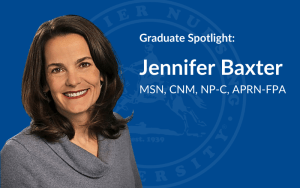





















 Carrie Belin is an experienced board-certified Family Nurse Practitioner and a graduate of the Johns Hopkins DNP program, Johns Hopkins Bloomberg School of Public Health, Georgetown University School of Nursing, and Johns Hopkins School of Nursing. She has also completed fellowships at Georgetown and the University of California Irvine.
Carrie Belin is an experienced board-certified Family Nurse Practitioner and a graduate of the Johns Hopkins DNP program, Johns Hopkins Bloomberg School of Public Health, Georgetown University School of Nursing, and Johns Hopkins School of Nursing. She has also completed fellowships at Georgetown and the University of California Irvine. Angie has been a full-scope midwife since 2009. She has experience in various birth settings including home, hospital, and birth centers. She is committed to integrating the midwifery model of care in the US. She completed her master’s degree in nurse-midwifery at Frontier Nursing University (FNU) and her Doctorate at Johns Hopkins University. She currently serves as the midwifery clinical faculty at FNU. Angie is motivated by the desire to improve the quality of healthcare and has led quality improvement projects on skin-to-skin implementation, labor induction, and improving transfer of care practices between hospital and community midwives. In 2017, she created a short film on skin-to-skin called
Angie has been a full-scope midwife since 2009. She has experience in various birth settings including home, hospital, and birth centers. She is committed to integrating the midwifery model of care in the US. She completed her master’s degree in nurse-midwifery at Frontier Nursing University (FNU) and her Doctorate at Johns Hopkins University. She currently serves as the midwifery clinical faculty at FNU. Angie is motivated by the desire to improve the quality of healthcare and has led quality improvement projects on skin-to-skin implementation, labor induction, and improving transfer of care practices between hospital and community midwives. In 2017, she created a short film on skin-to-skin called 










 Justin C. Daily, BSN, RN, has ten years of experience in nursing. At the start of his nursing career, Justin worked as a floor nurse on the oncology floor at St. Francis. He then spent two years as the Director of Nursing in a small rural Kansas hospital before returning to St. Francis and the oncology unit. He has been in his current position as the Chemo Nurse Educator for the past four years. He earned an Associate in Nurse from Hutchinson Community College and a Bachelor of Science in Nursing from Bethel College.
Justin C. Daily, BSN, RN, has ten years of experience in nursing. At the start of his nursing career, Justin worked as a floor nurse on the oncology floor at St. Francis. He then spent two years as the Director of Nursing in a small rural Kansas hospital before returning to St. Francis and the oncology unit. He has been in his current position as the Chemo Nurse Educator for the past four years. He earned an Associate in Nurse from Hutchinson Community College and a Bachelor of Science in Nursing from Bethel College. Brandy Jackson serves as the Director of Undergraduate Nursing Programs and Assistant Educator at Wichita State University and Co-Director of Access in Nursing. Brandy is a seasoned educator with over 15 years of experience. Before entering academia, Brandy served in Hospital-based leadership and Critical Care Staff nurse roles. Brandy is passionate about equity in nursing education with a focus on individuals with disabilities. Her current research interests include accommodations of nursing students with disabilities in clinical learning environments and breaking down barriers for historically unrepresented individuals to enter the nursing profession. Brandy is also actively engaged in Interprofessional Education development, creating IPE opportunities for faculty and students at Wichita State. Brandy is an active member of Wichita Women for Good and Soroptimist, with the goal to empower women and girls. Brandy is a TeamSTEPPS master trainer. She received the DASIY Award for Extraordinary Nursing Faculty in 2019 at Wichita State University.
Brandy Jackson serves as the Director of Undergraduate Nursing Programs and Assistant Educator at Wichita State University and Co-Director of Access in Nursing. Brandy is a seasoned educator with over 15 years of experience. Before entering academia, Brandy served in Hospital-based leadership and Critical Care Staff nurse roles. Brandy is passionate about equity in nursing education with a focus on individuals with disabilities. Her current research interests include accommodations of nursing students with disabilities in clinical learning environments and breaking down barriers for historically unrepresented individuals to enter the nursing profession. Brandy is also actively engaged in Interprofessional Education development, creating IPE opportunities for faculty and students at Wichita State. Brandy is an active member of Wichita Women for Good and Soroptimist, with the goal to empower women and girls. Brandy is a TeamSTEPPS master trainer. She received the DASIY Award for Extraordinary Nursing Faculty in 2019 at Wichita State University.  Dr. Sabrina Ali Jamal-Eddine is an Arab-disabled queer woman of color with a PhD in Nursing and an interdisciplinary certificate in Disability Ethics from the University of Illinois Chicago (UIC). Dr. Jamal-Eddine’s doctoral research explored spoken word poetry as a form of critical narrative pedagogy to educate nursing students about disability, ableism, and disability justice. Dr. Jamal-Eddine now serves as a Postdoctoral Research Associate in UIC’s Department of Disability and Human Development and serves on the Board of Directors of the National Organization of Nurses with Disabilities (NOND). During her doctoral program, Sabrina served as a Summer Fellow at a residential National Endowment of the Humanities (NEH) Summer Institute at Arizona State University (2023), a summer fellow at Andrew W. Mellon’s National Humanities Without Walls program at University of Michigan (2022), a Summer Research Fellow at UC Berkeley’s Othering & Belonging Institute (2021), and an Illinois Leadership Education in Neurodevelopmental and related Disabilities (LEND) trainee (2019-2020).
Dr. Sabrina Ali Jamal-Eddine is an Arab-disabled queer woman of color with a PhD in Nursing and an interdisciplinary certificate in Disability Ethics from the University of Illinois Chicago (UIC). Dr. Jamal-Eddine’s doctoral research explored spoken word poetry as a form of critical narrative pedagogy to educate nursing students about disability, ableism, and disability justice. Dr. Jamal-Eddine now serves as a Postdoctoral Research Associate in UIC’s Department of Disability and Human Development and serves on the Board of Directors of the National Organization of Nurses with Disabilities (NOND). During her doctoral program, Sabrina served as a Summer Fellow at a residential National Endowment of the Humanities (NEH) Summer Institute at Arizona State University (2023), a summer fellow at Andrew W. Mellon’s National Humanities Without Walls program at University of Michigan (2022), a Summer Research Fellow at UC Berkeley’s Othering & Belonging Institute (2021), and an Illinois Leadership Education in Neurodevelopmental and related Disabilities (LEND) trainee (2019-2020). Vanessa Cameron works for Vanderbilt University Medical Center in Nursing Education & Professional Development. She is also attending George Washington University and progressing towards a PhD in Nursing with an emphasis on ableism in nursing. After becoming disabled in April 2021, Vanessa’s worldview and perspective changed, and a recognition of the ableism present within healthcare and within the culture of nursing was apparent. She has been working since that time to provide educational foundations for nurses about disability and ableism, provide support for fellow disabled nursing colleagues, and advocate for the disabled community within healthcare settings to reduce disparities.
Vanessa Cameron works for Vanderbilt University Medical Center in Nursing Education & Professional Development. She is also attending George Washington University and progressing towards a PhD in Nursing with an emphasis on ableism in nursing. After becoming disabled in April 2021, Vanessa’s worldview and perspective changed, and a recognition of the ableism present within healthcare and within the culture of nursing was apparent. She has been working since that time to provide educational foundations for nurses about disability and ableism, provide support for fellow disabled nursing colleagues, and advocate for the disabled community within healthcare settings to reduce disparities. Dr. Lucinda Canty is a certified nurse-midwife, Associate Professor of Nursing, and Director of the Seedworks Health Equity in Nursing Program at the University of Massachusetts Amherst. She earned a bachelor’s degree in nursing from Columbia University, a master’s degree from Yale University, specializing in nurse-midwifery, and a PhD from the University of Connecticut. Dr. Canty has provided reproductive health care for over 29 years. Her research interests include the prevention of maternal mortality and severe maternal morbidity, reducing racial and ethnic health disparities in reproductive health, promoting diversity in nursing, and eliminating racism in nursing and midwifery.
Dr. Lucinda Canty is a certified nurse-midwife, Associate Professor of Nursing, and Director of the Seedworks Health Equity in Nursing Program at the University of Massachusetts Amherst. She earned a bachelor’s degree in nursing from Columbia University, a master’s degree from Yale University, specializing in nurse-midwifery, and a PhD from the University of Connecticut. Dr. Canty has provided reproductive health care for over 29 years. Her research interests include the prevention of maternal mortality and severe maternal morbidity, reducing racial and ethnic health disparities in reproductive health, promoting diversity in nursing, and eliminating racism in nursing and midwifery. Dr. Lisa Meeks is a distinguished scholar and leader whose unwavering commitment to inclusivity and excellence has significantly influenced the landscape of health professions education and accessibility. She is the founder and executive director of the DocsWithDisabilities Initiative and holds appointments as an Associate Professor in the Departments of Learning Health Sciences and Family Medicine at the University of Michigan.
Dr. Lisa Meeks is a distinguished scholar and leader whose unwavering commitment to inclusivity and excellence has significantly influenced the landscape of health professions education and accessibility. She is the founder and executive director of the DocsWithDisabilities Initiative and holds appointments as an Associate Professor in the Departments of Learning Health Sciences and Family Medicine at the University of Michigan. Dr. Nikia Grayson, DNP, MSN, MPH, MA, CNM, FNP-C, FACNM (she/her) is a trailblazing force in reproductive justice, blending her expertise as a public health activist, anthropologist, and family nurse-midwife to champion the rights and health of underserved communities. Graduating with distinction from Howard University, Nikia holds a bachelor’s degree in communications and a master’s degree in public health. Her academic journey also led her to the University of Memphis, where she earned a master’s in medical anthropology, and the University of Tennessee, where she achieved both a master’s in nursing and a doctorate in nursing practice. Complementing her extensive education, she completed a post-master’s certificate in midwifery at Frontier Nursing University.
Dr. Nikia Grayson, DNP, MSN, MPH, MA, CNM, FNP-C, FACNM (she/her) is a trailblazing force in reproductive justice, blending her expertise as a public health activist, anthropologist, and family nurse-midwife to champion the rights and health of underserved communities. Graduating with distinction from Howard University, Nikia holds a bachelor’s degree in communications and a master’s degree in public health. Her academic journey also led her to the University of Memphis, where she earned a master’s in medical anthropology, and the University of Tennessee, where she achieved both a master’s in nursing and a doctorate in nursing practice. Complementing her extensive education, she completed a post-master’s certificate in midwifery at Frontier Nursing University.









 Dr. Tia Brown McNair is the Vice President in the Office of Diversity, Equity, and Student Success and Executive Director for the Truth, Racial Healing, and Transformation (TRHT) Campus Centers at the American Association of Colleges and Universities (AAC&U) in Washington, DC. She oversees both funded projects and AAC&U’s continuing programs on equity, inclusive excellence, high-impact practices, and student success. McNair directs AAC&U’s Summer Institutes on High-Impact Practices and Student Success, and TRHT Campus Centers and serves as the project director for several AAC&U initiatives, including the development of a TRHT-focused campus climate toolkit. She is the lead author of From Equity Talk to Equity Walk: Expanding Practitioner Knowledge for Racial Justice in Higher Education (January 2020) and Becoming a Student-Ready College: A New Culture of Leadership for Student Success (July 2016 and August 2022 Second edition).
Dr. Tia Brown McNair is the Vice President in the Office of Diversity, Equity, and Student Success and Executive Director for the Truth, Racial Healing, and Transformation (TRHT) Campus Centers at the American Association of Colleges and Universities (AAC&U) in Washington, DC. She oversees both funded projects and AAC&U’s continuing programs on equity, inclusive excellence, high-impact practices, and student success. McNair directs AAC&U’s Summer Institutes on High-Impact Practices and Student Success, and TRHT Campus Centers and serves as the project director for several AAC&U initiatives, including the development of a TRHT-focused campus climate toolkit. She is the lead author of From Equity Talk to Equity Walk: Expanding Practitioner Knowledge for Racial Justice in Higher Education (January 2020) and Becoming a Student-Ready College: A New Culture of Leadership for Student Success (July 2016 and August 2022 Second edition).